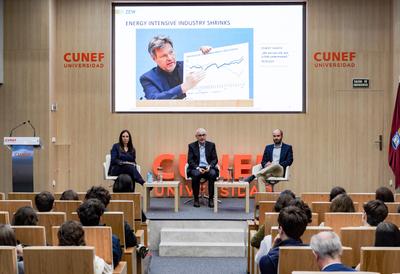
The Professorship of Exemplarity analyses the geopolitics of energy with the CEO of Enagás
November 27, 2024

Last Wednesday, 27 November, the Chair of Exemplarity, Javier Gomá Lanzón, and Arturo Gonzalo Aizpiri, CEO of Enagás, discussed the geopolitics of energy, the energy transition and the strategies of the different agents and countries worldwide. During the session, held in the Auditorium of the Almansa Campus, they highlighted several key ideas:
- Energy is essential to our way of life as humans, but we need a radical shift in the energy model to prevent a drastic and irreversible change in our planet’s climate.
- 25% of the energy consumed in the world comes from electrons (electricity). The remaining 75% comes mostly from fossil fuel (molecule) combustion, which generates CO2 and is causing climate change.
- Socio-economic revolutions have historically been based on new energy vectors. The Industrial Revolution, for example, originated with the widespread use of coal to produce the steam required for new industrial processes or transport means such as trains.
- In Spain, a sizeable amount of electricity is generated by renewable energies, but half of it is still produced from natural gas (combined cycles) or in nuclear power plants.
- The best way forward for Spain is renewable energy. One of these vectors, green hydrogen, is set up to be a decarbonisation alternative for industries that use molecules, such as aviation or maritime transport.
- The energy transition must serve three fundamental purposes: decarbonisation, to avoid climate change; strategic national autonomy, to achieve energy autonomy and security; and competitiveness.
- The country that has invested the most in low-carbon technologies over the past decade is China. It produces 80% of the world’s solar panels and over 50% of electric cars, and is becoming the largest supplier of energy transition technologies.
- The REPowerEU strategy, announced by the European Union days after the outbreak of the war in Ukraine, aims to leave behind dependence on Russia’s energy resources.
- The war in the Middle East has caused instability and unease, leading to an increase in energy prices, and a generalised sense of uncertainty.
- Everything points to a diminished role of the United States in the global fight against climate change during Donald Trump’s new administration.
- Spain has the potential to become a major renewable energy (electrons and molecules such as green hydrogen) hub in Europe, which could be a great driver for prosperity and progress.
